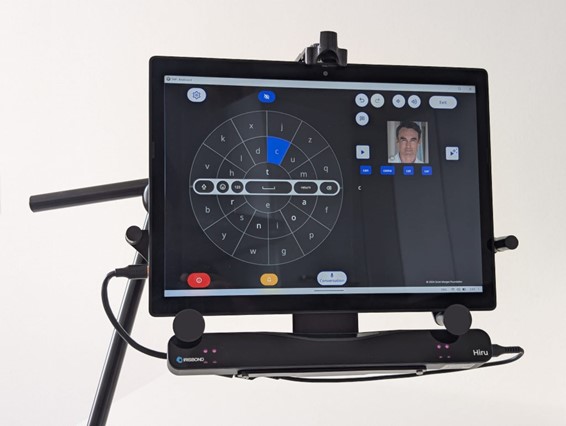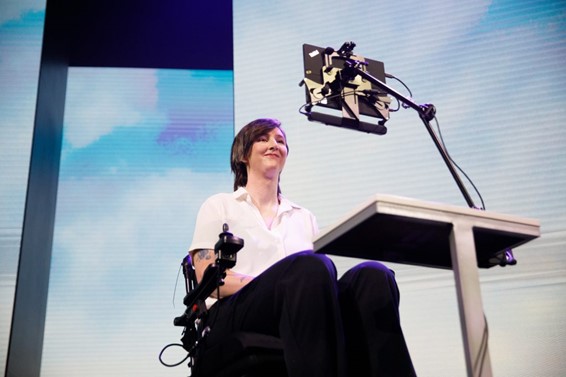MANILA, Philippines – At Lenovo Tech World 2024, groundbreaking technology showcased a vision where AI amplifies the voices of those with ALS and other severe disabilities, bringing hope and innovation to communication for people often left silent by their conditions.
Through a strategic collaboration, Lenovo and the Scott-Morgan Foundation (SMF) developed an AI-powered solution uniquely tailored for ALS, featuring an innovative circular keyboard interface, predictive AI for seamless communication, personalized voice replicas, hyper-realistic avatars, and cutting-edge eye-tracking technology.
For individuals with ALS, a neurodegenerative disorder that limits movement and speech, these tools bring life-changing potential, expanding options for many who rely on assistive tech. Testing is underway within SMF’s community, aiming to refine and expand this accessible AI solution. In an emotive demo, a father with ALS shared lullabies with his children, using his own voice—powered by this technology. The story underscored the solution’s personal impact and the inspiring possibilities ahead.

Human-centric design for real lives
Lenovo’s design leads collaborated closely with SMF to create intuitive user experiences, specifically tuned to the needs of those with ALS. “Seeing the technology in action reminds us why human-centered design is so crucial in assistive tech,” shared Daniel Pollock, Lenovo’s UX prototyper, adding that the company is committed to pushing the limits of AI’s practical applications.
Building a bridge to true self-expression
The assistive tech field has long been hindered by outdated voice banking tools, typically offering robotic and emotionless outputs. Now, Lenovo’s solution combines AI-trained voice replication and avatars capable of recreating emotional nuances, making communication as natural as possible.
The journey forward: refining and testing
While the tech is still being polished, early responses indicate a substantial shift in assistive technology capabilities. SMF and Lenovo will continue testing with real users, making refinements and seeking feedback to ensure it serves the needs of people worldwide.
A legacy of advocacy and innovation
This project honors Dr. Peter Scott-Morgan’s mission to empower individuals with disabilities through groundbreaking AI technology. SMF’s CEO Andrew Morgan sees this as just the beginning, anticipating ongoing advancements. “We believe that AI will continue to redefine assistive technology, making it more inclusive and impactful than ever.”
FAQ
What is the goal of the AI-powered solution unveiled at Lenovo Tech World?
The solution aims to improve communication options for people with ALS and severe disabilities, allowing them to express themselves using personalized AI voices and avatars.
Who collaborated to develop this solution?
Lenovo and the Scott-Morgan Foundation (SMF) partnered to create this AI-powered assistive technology.
What are the main features of the solution?
The solution includes predictive AI, hyper-realistic avatars, personalized voice replication, eye-tracking, and a unique circular keyboard interface.
How does the technology work?
The technology uses predictive AI and eye-tracking to enable quick and accurate communication, while hyper-realistic avatars and AI voice replicas make interactions feel more personal.
Where can this solution be used?
Currently, it’s tested with SMF’s ALS community and leading clinicians, with hopes to scale for broader use in various environments.
Why is this technology important?
It enables more natural, expressive communication for individuals who are often unable to speak or move independently, breaking down barriers and increasing inclusion.

